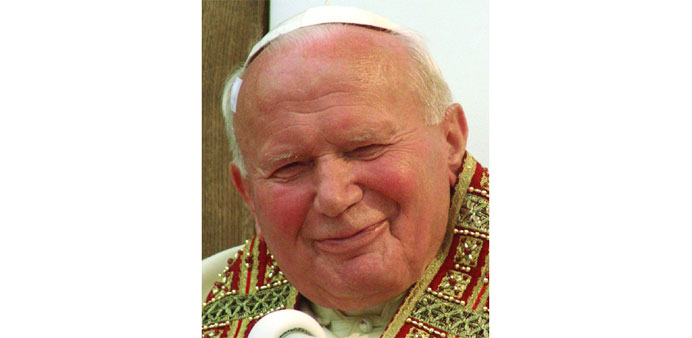John Paul II: his supporters say the late pope was kept in the dark about the abuses
Reuters/Vatican City
The Catholic prelate who led the campaign to make the late pope John Paul II a saint exonerated the pontiff yesterday against accusations that he turned a blind eye to one of the church's biggest sexual abuse scandals.
Victims of sexual abuse quickly criticised the prelate's defence of John Paul, who died in 2005 and will be made a saint at a ceremony this weekend along with pope John XXII, who reigned from 1958 to 1963.
While the late Polish pope is almost universally hailed for his role in helping bring about the fall of communism, his critics say that he was slow to grasp the seriousness of the sexual abuse crisis that emerged towards the end of his pontificate.
Specifically, critics have been pressing the Vatican over what the pope knew about sexual abuse by Father Marcial Maciel, the Mexican founder of a disgraced Catholic religious order, the Legionaries of Christ.
Maciel lived a double life for years as a paedophile, womaniser, and drug addict while running the order he founded and being held up as an example of an outstanding religious leader.
The order had many wealthy conservative benefactors who saw it as a bulwark against liberalism in the church.
"There is no sign of a personal involvement of the Holy Father in his matter," Monsignor Slawomir Oder said when asked what John Paul knew about Maciel's misdeeds.
Oder, a Pole who was "postulator" of the cause to make John Paul a saint, said that documents studied during the sainthood investigation gave a "a response that was very clear" exonerating the pope from personal blame in the Maciel case.
For years, the worldwide order enjoyed the backing of the pope and the Vatican dismissed accusations by seminarians that Maciel had abused them sexually, some when they were as young as 12.
John Paul strongly backed Maciel even as criticism of the priest mounted.
John Paul's defenders have said that while aides might have known the allegations were true, they kept much information from the pope, who believed they were part of a plot against the church similar to those by communist authorities in his native Poland during the Cold War.
The late pope's critics contest this version.
"Popes can't wield massive power yet evade responsibility for massive wrongdoing just because his aides may have carefully shielded him from the gory details," the US-based Survivors Network of those Abused by Priests (SNAP) said in a statement.
In 2006, a year after John Paul's death, a new Vatican investigation concluded the accusations of molestation – previously denied – were actually true.
Pope Benedict XVI ordered Maciel to retire to a life of "prayer and penitence".
Maciel died in 2008 and after his death, investigations found he had also fathered several children with at least two different women, visited them regularly and sent them money. He also molested his own children, the investigation showed.
"The Vatican is shadow boxing. The man is becoming a saint, so why hide the truth? What are they covering?" said Jason Berry, co-author of the 2004 book Vows of Silence, which exposed Maciel's history of abuse.
In February, the Legionaries officially denounced Maciel for his "reprehensible and objectively immoral behaviour" and apologised to his many victims.
The order continues to run private Catholic schools and charitable organisations in 22 countries through its network of some 950 priests and 1,000 seminarians.
It operates a Catholic university in Rome and its lay movement, known as Regnum Christi, has around 30,000 members.

